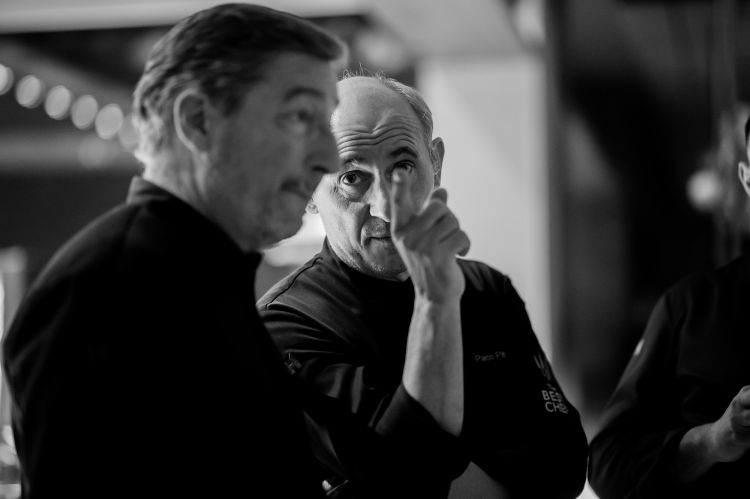In the jumble of stars and rankings to which everyone aspires, there are those who quietly carry on their work, navigating in a parallel dimension. El Celler de Can Roca, three Michelin stars since 2010 and twice at the top of the World's 50Best, is in the circle of the untouchables: practically unbeatable, it plays in a league of its own, we could say.
Joan Roca, chef and owner of Celler together with his two brothers, is a quiet professional, almost shy in talking about himself. A great underlying humility and a personality predisposed to listening and confrontation. We met him at a four-handed dinner at the elegant restaurant Arco by Paco Perez, in Gdansk, Poland. Roca and Perez are long-time friends, they share the same passion for the land, for Spanish tradition and they both rely on teams of passionate and ambitious young people.
Good morning Joan, what choices have you made to improve work organisation, employee conditions?
We have two separate brigades: one takes care of lunch, the other of dinner. Our job is exhausting, with complicated schedules: as soon as we could afford it, we made this choice. At the same time, for about eight years there has been a psychologist working closely with our team. She is not an individual counsellor but specialises in analysing and resolving conflicts and group tensions, which inevitably arise. We have very young team members, full of energy, competitive, of different nationalities: we need to give everyone space, make them feel part of a common project. This is crucial for overall harmony and maintaining quality.

I can't make a definitive judgement because I don't know the reality of Noma that well. However, I have the utmost respect for their choice. I think that managing restaurants of this kind is not easy but neither is it impossible. Each reality expresses a world of its own and René Redzepi has made a very well-considered decision. And painful, probably. I believe that in order to run machines like these, you must have a defined model and apply it consistently and precisely. It is crucial to find the right formula and there is not just one but a combination of many. One thing is certain: in economic terms, the benefits are small. Catering has never been big business, nor will it ever be.
In terms of sustainability, you presented Tierra Animada some time ago. What exactly is it about?
It is a botanical project of recovering old seeds and planting new plants and species. We cultivate five hectares of our own property, with hired staff dedicated to study, experimentation and training. The scientific team has been working with us for more than ten years and we have been collaborating for five years with a professional chemist: with him we have developed a distillate project that will soon debut on the market. I would like to emphasise that the research we conduct is not only aimed at the dish, the recipe, but concerns our small universe in a broad sense. Every day in the kitchen, three people test techniques, sauces, pairings, cooking techniques. The work is constant, it never stops. I always tell my guys that the important thing is to arrive home at night tired but not fed up.
From a gastronomic point of view, what developments should we expect from a landmark restaurant like yours?
Our goal is to strive to be a model for new generations and new businesses. Example is the highest form of teaching, it is true, but we must strive to transmit knowledge in an almost academic way. Training and innovation: this is where the catering of the future is at stake. In the shift of vision, of mentality, of approach. Those who are successful and enjoy benefits, including economic ones, must act as trailblazers, as true guides.
How do you imagine el Celler in 10 years’ time?
Good question! If health accompanies us, I still imagine us brothers, all three of us, united by passion and perhaps with our children at our side. Even though they have studied something else, they seem to want to take this career seriously and I can only be happy about that. We founded el Celler 36 years ago: despite the difficulties, and thinking about how much the world has changed, we have never lost our will, our ambition, our seriousness.
Translated into English by Slawka G. Scarso